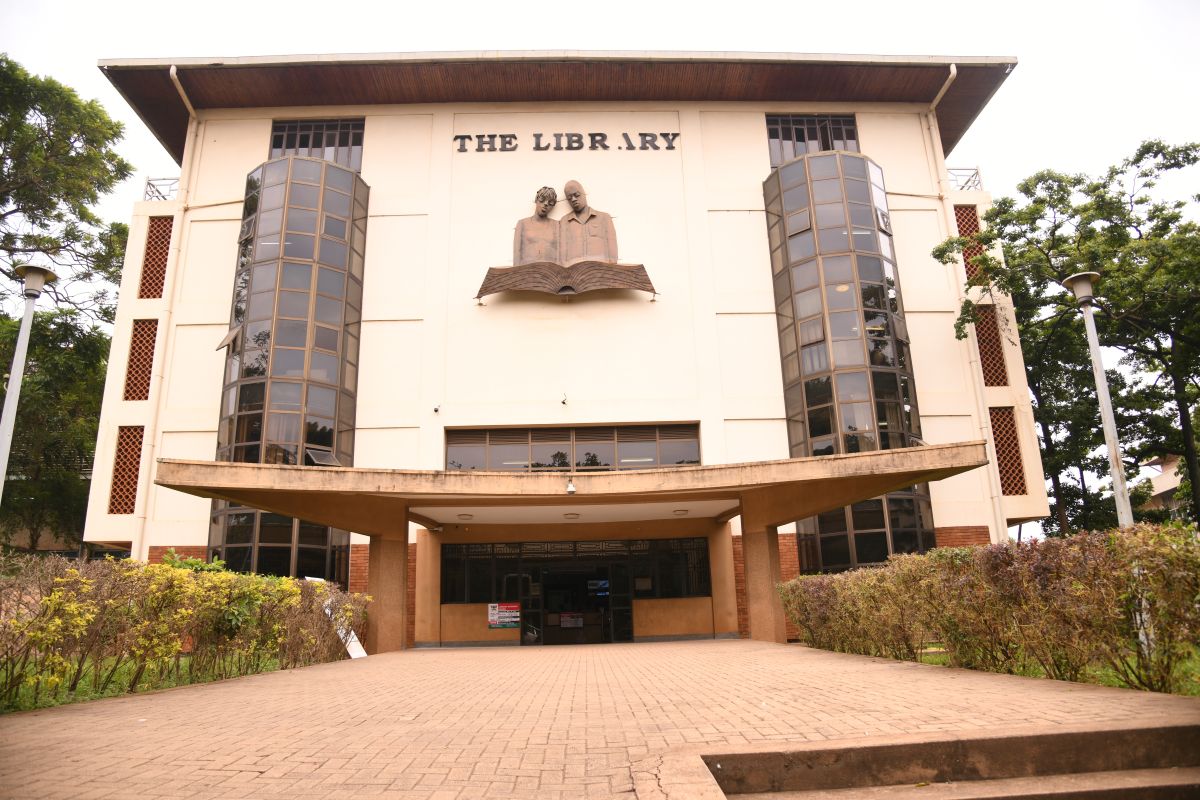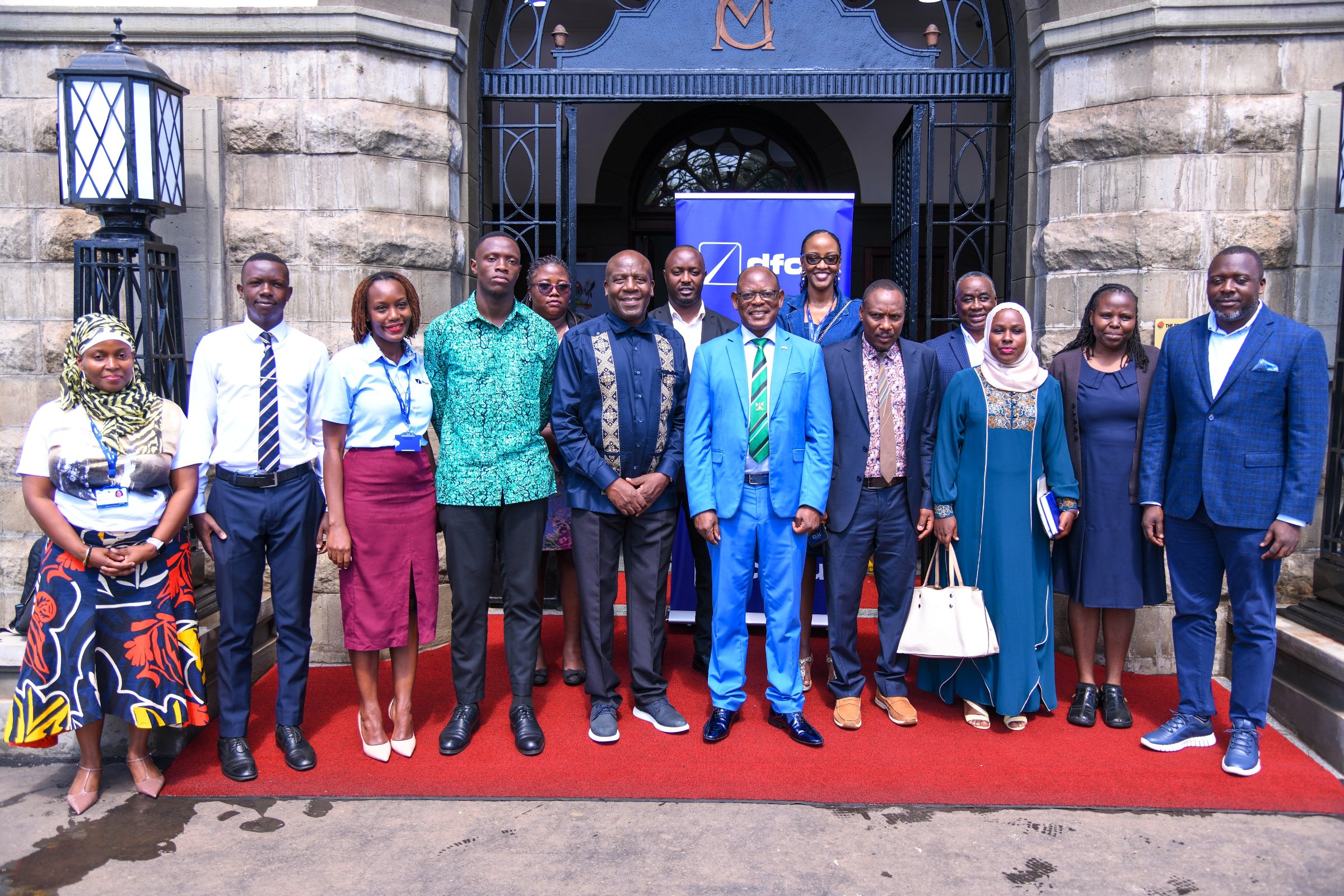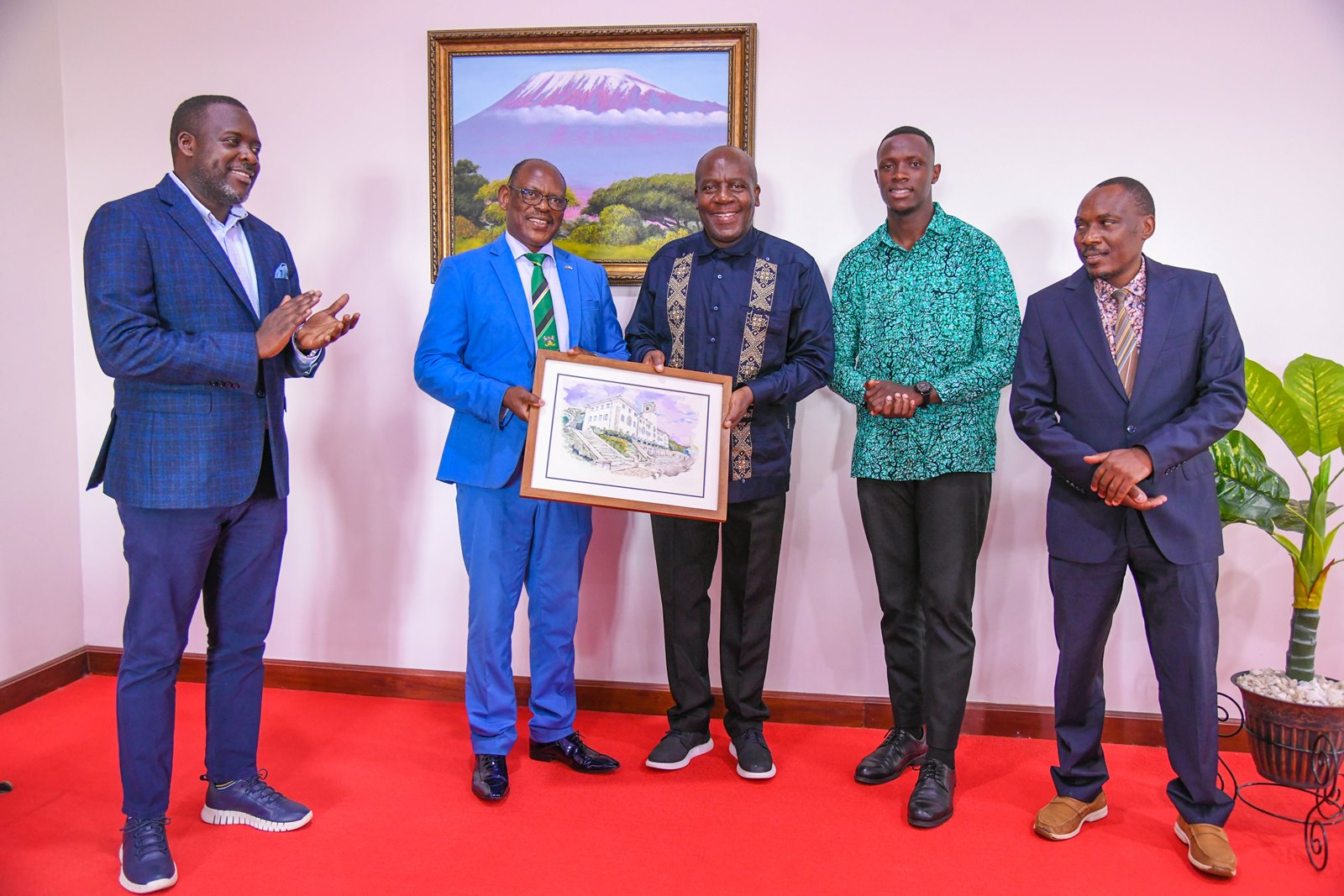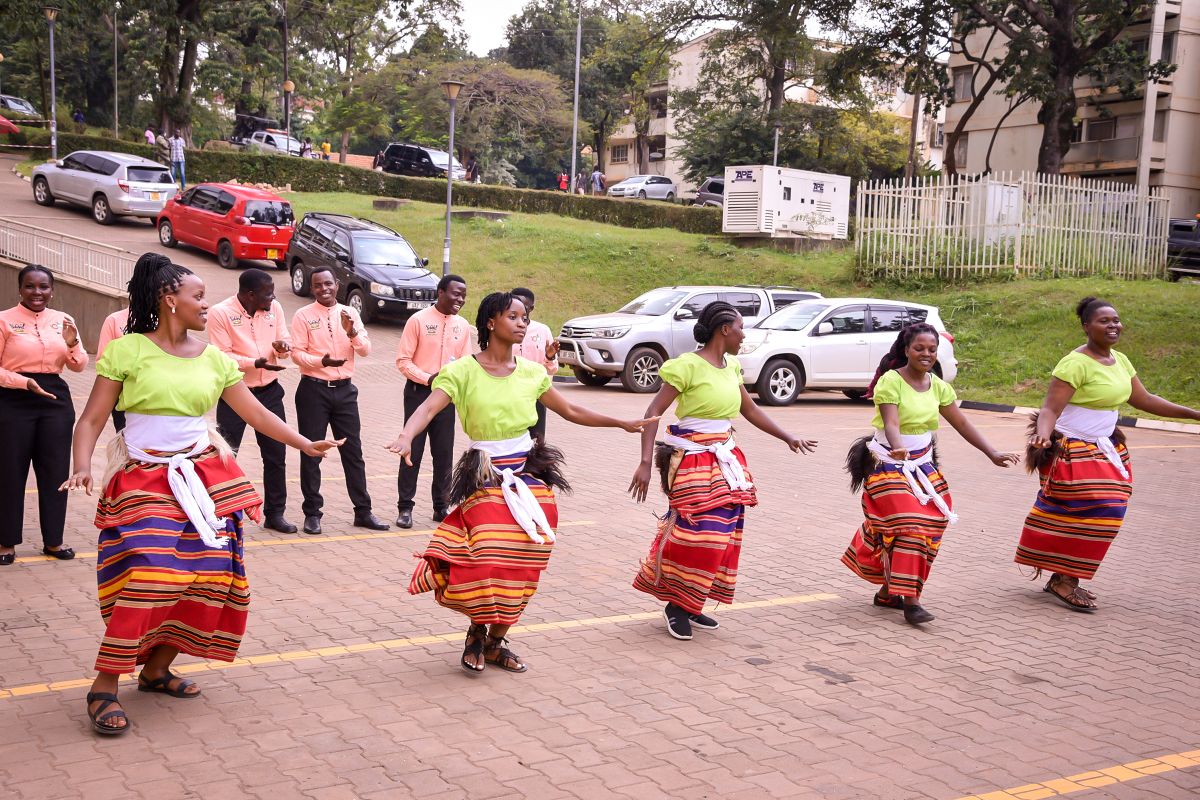The iLABS@MAK Project, Faculty of Technology, Makerere University organized the first Consultation seminar on the formation of “The National Remote Engineering Consortium” held at the Imperial Royale Hotel on Friday 27th November 2009.
The iLABS@MAK Project, Faculty of Technology, Makerere University organized the first Consultation seminar on the formation of “The National Remote Engineering Consortium” held at the Imperial Royale Hotel on Friday 27th November 2009.

The co-hosts of the day Paul Isaac Musasizi, Project Administrator, iLABS@MAK project and Proscovia Nakazinga, Developer iLABS@MAK project thanked guests for making time despite the public holiday and announced the theme of the day “Enriching Science Education through Remote Engineering”.
The Principal Investigator iLABS@MAK Project Prof. Sandy S. Tickodri-Togboa in his keynote address outlined the relevance of Remote Engineering in Science Education citing some applications already implemented at Makerere University such as The iLABS project at the Faculty of Technology executed in collaboration with Massachusetts Institute of Technology (MIT) , Obafemi Awolowo University(OAU) Nigeria and the University of Dar-es-Salaam (UDSM) Tanzania with support from National Instruments and The MIT Open Course Ware project, aimed at freely sharing course material and references from MIT with the rest of the world.
 Other Remote Engineering applications identified include Video Conferencing, High-Tech digital libraries and collaborative development of software solutions, which with the advancement in Technology and infrastructural support such as the establishment of faster internet connections through the submarine fiber connections are the way to go.
Other Remote Engineering applications identified include Video Conferencing, High-Tech digital libraries and collaborative development of software solutions, which with the advancement in Technology and infrastructural support such as the establishment of faster internet connections through the submarine fiber connections are the way to go.
He then cited a case study of The Internet2 , a non-profit consortium project conceived as an application-driven project, designed to be a complimentary network to support advanced scientific applications. This project, founded when representatives from 34 American Universities met in 1996 currently receives financial support from more than 180 Universities, over 80 companies and the US government.
In concluding his address, Prof. Togboa observed that we have to work together, like never before to make Education address the diversity of needs, expectations and interests in their cultural contexts noting that Remote Engineering can improve the quality of teaching, learning and sharing knowledge and information.
 Prof. Nawangwe , Dean, Faculty of Technology, thanked Prof. Togboa for his address and invited Prof. Venansius Barymureeba, Acting Vice Chancellor, Makerere University to make his remarks. Prof. Baryamureeba thanked the Minister of Higher Education, Permanent Secretary, Ministry of ICT, representatives from the private sector, Heads of Secondary Schools and various stakeholders for sparing time to attend this first consultation meeting. Voicing his support for the formation of a National Remote Engineering Consortium, he congratulated the Faculty of Technology for astutely being a model as far as furthering research critical to improving the teaching and learning methods in Makerere University is concerned, thanking Prof. Togboa’s for his valuable contribution in this regard. He then invited the Minister of Higher Education to officially open the seminar.
Prof. Nawangwe , Dean, Faculty of Technology, thanked Prof. Togboa for his address and invited Prof. Venansius Barymureeba, Acting Vice Chancellor, Makerere University to make his remarks. Prof. Baryamureeba thanked the Minister of Higher Education, Permanent Secretary, Ministry of ICT, representatives from the private sector, Heads of Secondary Schools and various stakeholders for sparing time to attend this first consultation meeting. Voicing his support for the formation of a National Remote Engineering Consortium, he congratulated the Faculty of Technology for astutely being a model as far as furthering research critical to improving the teaching and learning methods in Makerere University is concerned, thanking Prof. Togboa’s for his valuable contribution in this regard. He then invited the Minister of Higher Education to officially open the seminar.
Hon. Mwesigwa Rukutana the Minister of State for Higher Education extended a warm welcome to his fellow members of the cabinet, representatives Educational Institutions and all delegates present including Andrew Watchorn and Lesley Yu from National Instruments, noting that their presence reiterated their commitment to improving the teaching and learning experience in Uganda.
 He re-affirmed The Government of Uganda’s commitment to making education for all a reality and preparing all citizens to meet the challenges of the 21st century. “This is why deliberate macro development policies and reforms like Universal Primary Education (1997) and Universal free Secondary Education (2007) were introduced as a key ingredient of the Educational Strategic Plan.”
He re-affirmed The Government of Uganda’s commitment to making education for all a reality and preparing all citizens to meet the challenges of the 21st century. “This is why deliberate macro development policies and reforms like Universal Primary Education (1997) and Universal free Secondary Education (2007) were introduced as a key ingredient of the Educational Strategic Plan.”
He then challenged all stakeholders to utilize Remote Engineering in combating other social problems like the burden of poverty and HIV/AIDS “These are challenges we are facing across the nation, whose prevalence would be less with improved information dissemination.”
The Minister then noted that despite the Nation’s comparable or even better commitment to education, research and innovation in the region, we were not generating as many innovations, new business ideas and new jobs as some other African countries. He however hoped that the seminar would offer an opportunity to take a huge stride in the positive direction and declared the seminar open.
 Andrew Watchorn, Senior Academic Field Engineer National Instruments who had prior to the seminar spent four days in the Faculty of Technology training students from several Universties noted that Uganda had some of the most intelligent young minds in the world. Andrew noted that applications such as those used during his four-day training were being utilized as components in world ground-breaking innovations such as the LEGO MINDSTORM NXT software and the CERN Large Hadron collider .
Andrew Watchorn, Senior Academic Field Engineer National Instruments who had prior to the seminar spent four days in the Faculty of Technology training students from several Universties noted that Uganda had some of the most intelligent young minds in the world. Andrew noted that applications such as those used during his four-day training were being utilized as components in world ground-breaking innovations such as the LEGO MINDSTORM NXT software and the CERN Large Hadron collider .
“The Education of Engineers cannot stop at what they learn in class or theory”. Andrew noted that instructors must go ahead and train engineers to apply their theory and continuously innovate.
 Associate Prof. Lugojjo, Head, Department of Electrical Engineering at the Faculty of Technology in his address called upon the Government, Private and Public sectors to come on board so as to leverage, implement and sustain innovations in our Institutions of Higher Learning. He encouraged all stakeholders to facilitate and demystify the teaching of Science and Technology in schools “We should democratize Science and Technology so as to encourage more students to take on science subjects and engineering”. He observed that he had so many brilliant project write-ups and theses written by his former students that were unfortunately gathering dust on shelves, hence reiterating the need to translate these materials to practical innovations.
Associate Prof. Lugojjo, Head, Department of Electrical Engineering at the Faculty of Technology in his address called upon the Government, Private and Public sectors to come on board so as to leverage, implement and sustain innovations in our Institutions of Higher Learning. He encouraged all stakeholders to facilitate and demystify the teaching of Science and Technology in schools “We should democratize Science and Technology so as to encourage more students to take on science subjects and engineering”. He observed that he had so many brilliant project write-ups and theses written by his former students that were unfortunately gathering dust on shelves, hence reiterating the need to translate these materials to practical innovations.
In his remarks, Prof. Barnabas Nawangwe , Dean, Faculty of Technology appreciated the timeliness of the consultation meeting, considering that the submarine cable was now operational and Makerere’s own brilliant students were rubbing shoulders and collaborating with their peers from MIT to come up with innovations like the vision200 car.
 “Sharing resources is a commendable thing” said Prof. Nawangwe as he noted that with the use of projects like iLABS@MAK, students were able to share engineering applications with peers in the faculty and other universities using the LabVIEW software. He however noted that the missing link was the lack of close cooperation between several stakeholders i.e. the Ministries, Universities, public and private sectors. He then requested the National Instruments representative to publish innovations from Makerere University on their company website.
“Sharing resources is a commendable thing” said Prof. Nawangwe as he noted that with the use of projects like iLABS@MAK, students were able to share engineering applications with peers in the faculty and other universities using the LabVIEW software. He however noted that the missing link was the lack of close cooperation between several stakeholders i.e. the Ministries, Universities, public and private sectors. He then requested the National Instruments representative to publish innovations from Makerere University on their company website.
Prof. Michael Lejeune Deputy Executive Director, Uganda National Council for Higher Education kicked off his address with noting that the job of the Council was to ensure that the quality of education in Uganda is held high. The council had also observed a growing trend in the number of e-degrees and has had to put into place measures to evaluate their validity and merit.
 With regard to Remote Engineering, Prof. Lejeune commended Makerere University for embracing innovation and keeping up with the technological trends in the industry. Considering that the East African Community integration process was becoming more of a reality daily, the future might see the formation of policies stating minimum requirements for graduation that will be effected across the region. In concluding his remarks, Prof. Lejuene noted that “Uganda needs us all to develop this country. Lets all do it with enthusiasm”
With regard to Remote Engineering, Prof. Lejeune commended Makerere University for embracing innovation and keeping up with the technological trends in the industry. Considering that the East African Community integration process was becoming more of a reality daily, the future might see the formation of policies stating minimum requirements for graduation that will be effected across the region. In concluding his remarks, Prof. Lejuene noted that “Uganda needs us all to develop this country. Lets all do it with enthusiasm”
 The Guest of Honor and Permanent Secretary, Ministry of ICT, Dr. Jimmy Saamanya thanked Makerere for organizing the consultative seminar aimed at forming a National Remote Engineering Consortium. As a background to his address he noted that previously as a result of higher bandwidth costs via satellite, the region may have lagged behind and missed out on advancements that have been made by other countries like India and the United States. However, with the advent of faster and higher capacity internet connections through the submarine cables, the Minister reckoned that we should be in a better position to compete favorably and produce more innovations.
The Guest of Honor and Permanent Secretary, Ministry of ICT, Dr. Jimmy Saamanya thanked Makerere for organizing the consultative seminar aimed at forming a National Remote Engineering Consortium. As a background to his address he noted that previously as a result of higher bandwidth costs via satellite, the region may have lagged behind and missed out on advancements that have been made by other countries like India and the United States. However, with the advent of faster and higher capacity internet connections through the submarine cables, the Minister reckoned that we should be in a better position to compete favorably and produce more innovations.
With regard to legislation, the Ministry has pushed for the passing of three bills namely The Electronic Signature bill, The Electronic Transactions bill and the Computer Misuse Bill , all designed to regulate online activity in Uganda. With regard to partnering with Institutions of Higher Learning, he noted that that the Ministry of ICT was working with the College of Health Sciences on e-medicine collaborations linking Makerere to American Universities.
Presentations of the day saw Andrew Watchorn exhibit how National Instruments partnered with American Universities to produce spin-off companies like TORC (Virginia Tech) and EVIROFIT(Colorado State University) . In a practical demonstration of the power and ease of use of National Instruments products, Andrew built an “Illustration on Vibration Systems” using the LabVIEW software, a laptop and the National Instruments Educational Laboratory Virtual Instrumentation Suite (NI ELVIS) module in under eight minutes.
Andrew then cited an example of how students, with the aid of their Professor led to the formation of Mashavu (Swahili for “Chubby cheeked”) . The project enables medical professionals around the world to connect with patients in the developing world using modern technology and communications infrastructure. Prof. Khanjan Mehta , Senior Research Associate, Electronic and Computer services, Penn State University and one of the students’ team faculty advisors noted that the project is a laptop-based system designed to use the existing mobile phone infrastructure.
 Students on the iLABS@MAK project team led by Orishaba Doreen a Fourth year Electrical Engineering student went ahead to demonstrate the merits of the LabVIEW software. Tom Kigezi, Developer and Second year Electrical Engineering student then walked delegates through the structures and activities of the iLABS team before Nicholas Mpanga, Developer and Third year Telecommunications Engineering student made an online demonstration of how an iLAB is conducted.
Students on the iLABS@MAK project team led by Orishaba Doreen a Fourth year Electrical Engineering student went ahead to demonstrate the merits of the LabVIEW software. Tom Kigezi, Developer and Second year Electrical Engineering student then walked delegates through the structures and activities of the iLABS team before Nicholas Mpanga, Developer and Third year Telecommunications Engineering student made an online demonstration of how an iLAB is conducted.
In his closing remarks Prof. Lugujo expressed his disappointment as some of his brilliant students after graduation go on to seek better paying jobs at the expense of turning their project ideas into cutting-edge innovations. He however had hope that this would all change as “LabVIEW will provide a confluence of aspirations to bridge generations” and foster innovation. He urged all stakeholders present to continue collaborating so as to make the National Remote Engineering Consortium a reality. On behalf of the Acting Vice Chancellor and his Deputy Vice Chancellor Finance & Administration and the Dean, Faculty of Technology, he thanked everyone present for coming and encouraged them to continue with the good work, urging all students to keep up with the enthusiasm as they were the heirs of Science and Technology.
Click on links below to view respective powerpoint presentation
Minister of State for Higher Education's Full Speech
Vice Chancellor's Full Speech
Dean, Faculty of Technology's Full Speech
Principal Investigator iLABS@MAK-presentation of the Position Paper
Presentation by Andrew Watchorn-National Instruments Senior Academic Field Engineer
Presentation by students on their ILABS experience

 Education1 day ago
Education1 day ago
 General1 week ago
General1 week ago
 General2 weeks ago
General2 weeks ago
 General4 days ago
General4 days ago
 General2 weeks ago
General2 weeks ago




